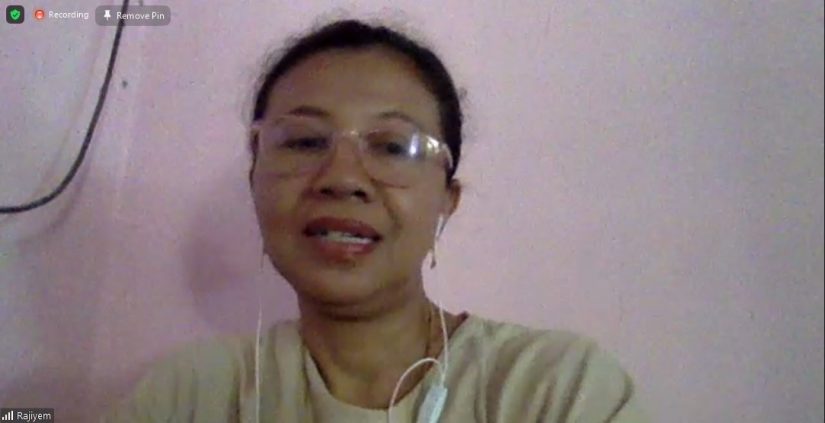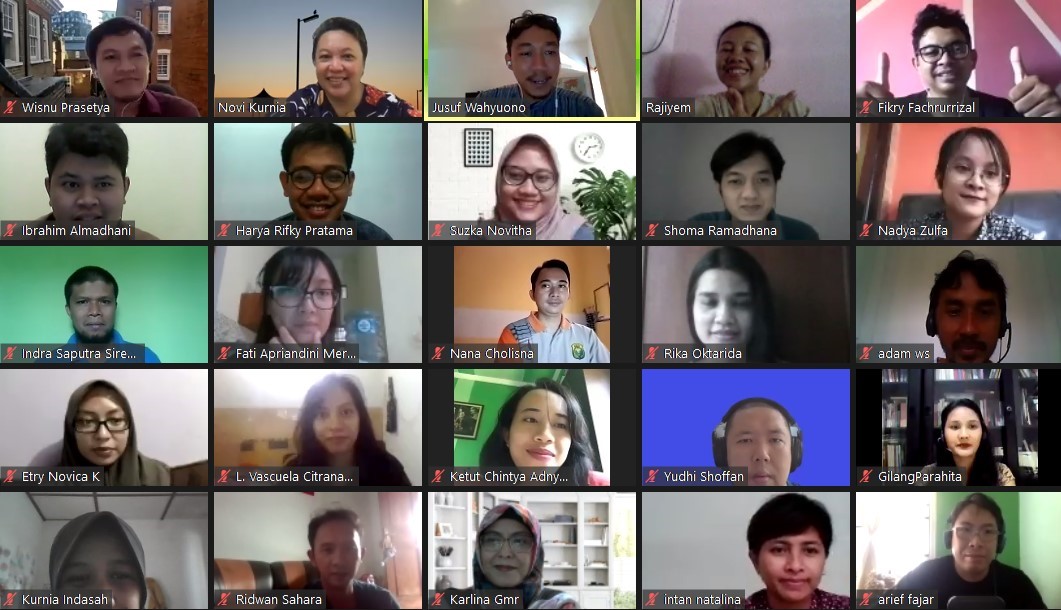
Yogyakarta, November 13th 2020—Master of Communication Science Program of Department of Communication Science FISIPOL UGM held an event Journal Writing Strategy Workshop & Journal Writing Assistance Program Inauguration. According to the Secretary of the Master Program of Department of Communication Science of UGM, Adam Wijoyo Sukarno, this event aims to develop and foster enthusiasm for the students of the Master Program of Department of Communication Science in writing scientific journals. The event, which was attended by more than 80 students of the Master Program of Department was moderated by Jusuf Ariz Wahyuono as a moderator and presented three lecturers of Department of Communication Science as the speakers: Rajiyem, Gilang Desti Parahita, and Wisnu Prasetyo Utomo.
Rajiyem explained about the strategy of writing journal articles in the field of Communication Science. According to the Editor in Chief of the Jurnal Media dan Komunikasi (JMKI), before writing journal articles, writers must understand the types, characters, and maps of journals in the field of Communication Science. She added that the writers must understand the goal of their journals. In addition, Rajiyem said, writers also need to understand the focus of the journal scope and author guidelines or guidelines for writing journal articles. According to Rajiyem, writers must also prepare their mentals in writing journal articles due to the long process. “We have to manage time to maintain consistency in writing journal articles,” Rajiyem said.

Furthermore, Gilang explained the things that need to be considered in writing scientific journal articles. He explained that there are three main things in writing journal articles: formulating topics and problems, compiling arguments, and understanding the systematics of journal articles. Gilang said inspiration for writers could come from mapping the field of communication science, communication journal articles, empirical phenomena of media and communication, and professional communication practices.
This editor at the Jurnal Komunikasi UII emphasized the importance of argument as the key to the originality or novelty of writers in writing journal articles. “An argument is a series of propositions consisting of conclusions and a collection of premises to see novelty in any scientific work,” Gilang explained.
Next, Wisnu explained the material about the online journal system to the participants. According to Wisnu, the writers also need to understand the online journal mechanism so that the journal manuscript can be well received. He explained that currently almost all journals use a scientific journal management platform called the Open Journal System (OJS). According to Wisnu, the ease of collecting journal manuscripts can cause ethical problems for writers. He explained, there are many cases of novice journal writers who submit one journal article manuscript to several journal platforms because they cannot wait for the journal-making process. In fact, in the context of journal writing, from collection to publication, it requires a long process, can be months or even years. “Carelessly submitting one manuscript to several journals can lead to ethical violations that will harm the name of the author himself,” said this Editor Secretary of JMKI.
In the question and answer session, several participants enthusiastically asked the speakers. One of the participants, Indra Saputra asked about the guidelines for writing book or journal citations from the second source. According to Rajiyem, the writer must read the first source book or journal that becomes the reference for the scientific writing that the prospective journal article writer wants to quote. Likewise, Gilang also suggested that the author read the references from the first source, unless the writing of the first source is already difficult to find because it does not exist anymore. “Because, the opportunity for plagiarism from there is very large,” Gilang said. According to Gilang, the writers need to read the first source to avoid differences in the perception of the second source writer.
The event was then continued with the launch of a journal article writing mentoring program for 12 Master of Communication Science students by the Head of the Master Study Program of Department of Communication Science, Novi Kurnia. Novi explained that the average journal articles for Master of Communication Science students come from their thesis. She added that the Master of Communication Science Program hopes that the first, second, and third semester students will collect journal articles from class papers via email for the Master of Communication Science Program. The articles will select up to 12 writers who are considered to be the most ready to receive journal writing assistance. Novi reminded students not to be discouraged in writing journal articles. “Writing a journal does require persistence and courage to be published successfully,” Novi said.
